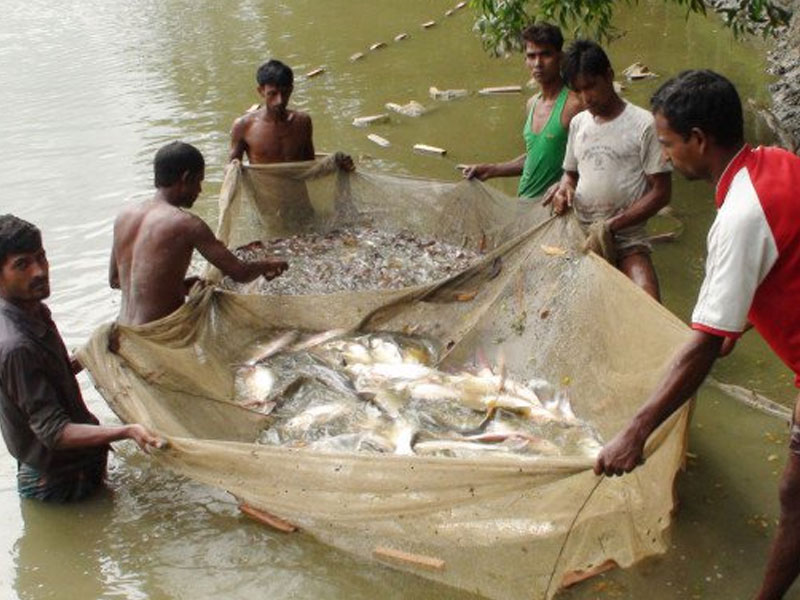The Role of Blockchain Technology in Asia Pacific’s Decentralized Finance Ecosystem
SOURCE: HTTPS://CITYLIFE.CAPETOWN/
NOV 06, 2023
Bringing high tech to non-tech food supply chain: Will blockchain traceability take off?
SOURCE: TBSNEWS.NET
OCT 10, 2021

Blockchain traceability can increase the value of fish products among product-conscious customers, allowing our aquaculture farmers to receive the correct value for their hardwork. Photo: TBS
How many times, while buying farmed fish from your neighbourhood kitchen market, have you wondered where it came from, what it was fed and how safe it is to consume the fish?
While these questions are left hanging in the air, the answers were never readily available if there were any to begin with.
To bring about change in this scenario, Bangladesh Aquaculture Activity (BAA), in partnership with a Chennai-based company- ByteAlly Software, tested a blockchain traceability system involving a small group of fish farmers.
The stated purpose of the project was to create a traceable environment 'by gathering market-relevant data from all aquaculture supply chain participants.'
The participants of the system were all based in Jashore.
"The fish products lose value to product-conscious customers due to the absence of traceability," Md Imtiaj Haque, Senior Market System Specialist at BAA told The Business Standard. Blockchain technology can significantly complement and add more value to the marketed food products, he added.
BAA is a USAID (United States Agency for International Development)-funded organisation, working with a goal to sustainably improve the livelihoods of fish farmers and other aquaculture market players by applying a market systems approach. It operates in the southern districts of Bangladesh.
The parties involved in the project hope that blockchain technology will instil consumers' trust in the aquaculture value chain by capturing necessary market-relevant data. The traceability information reveals the origin of food and helps the customer avoid products of inferior quality.
The pilot project was able to get 50 stakeholders on board, according to a press release distributed by ByteAlly Software. The system allows farmers to upload relevant data via web and mobile applications.
The implementing organisations expect that smallholder farms will benefit from the project by building trust with other market actors through leveraging clean data and optimising supply.
Currently, BAA is looking forward to implementing the project on a larger scale.
When implemented, the produce will be available in super shops with a barcode. Customers will then be able to scan the barcodes to see detailed information regarding the origin of the fish, the ingredients used in the fish feed, etc.
However, BAA is still unsure when the system will begin serving the customers. It depends on ByteAlly, Imtiaj Haque said.
The system is using IBM's blockchain facility, which is expensive. Once the funding from USAID is stopped at the end of the project's life, sustained investment in the blockchain system will be required, which will depend on finding a feasible business model.
An international organisation had previously tested a paper-based traceability system, informed Imtiaj, but then after it ended the project was never scaled up.
Still, BAA is optimistic it will be different this time.
When asked if ByteAlly is interested in investing in the business, Karthikeyan Mani, the CEO of ByteAlly Software said, "Yes. We have already done that and will continue to sustain the product and grow."
Since traceability is dependent on data input by the farmers themselves, there is a question of the credibility of that data. When asked how the organisation is planning to ensure the correctness of data, BAA's Senior Market System Specialist informed that it will have to be ensured through regular audits.
All these combined, the added traceability is feared to contribute to increasing the price of the products significantly. Will that discourage the customers from buying them?
The BAA analyst thought otherwise. "There is an obvious price difference between kitchen markets and super shops. People are ready to pay more for safe food," the analyst explained.
Asked to explain why the integration of an expensive technology like blockchain is necessary instead of cheaper web-based solutions, the CEO of ByteAlly Software said, "Blockchain is used as opposed to simple data entry because even if you lie with your data, you can never undo the lie."
"At ByteAlly, we have invested in building an ERP that can be configured and handed over as easy-to-use mobile apps to farmers that will upload data to blockchain systems. Such aiding tools are critical and make blockchain projects shorter and cheaper. Making traceability initiatives affordable is in the best interest of all the stakeholders involved," Karthikeyan added.
With the successful completion of the pilot project, the initiative is hoping to board thousands of fish farmers in the coming years.
"I dream that every aquaculture farmer in Bangladesh receives the correct value for their hard work. I firmly believe that blockchain technology can help us realise that dream," said Md Imtiaj Haque.
LATEST NEWS
Augmented Reality
Hi-tech smart glasses connecting rural and remote aged care residents to clinicians
NOV 20, 2023
WHAT'S TRENDING


Data Science
5 Imaginative Data Science Projects That Can Make Your Portfolio Stand Out
OCT 05, 2022

SOURCE: HTTPS://CITYLIFE.CAPETOWN/
NOV 06, 2023
SOURCE: HTTPS://WWW.FORBES.COM/
SEP 22, 2023
SOURCE: HTTPS://WWW.THECOINREPUBLIC.COM/
SEP 03, 2023
SOURCE: HTTPS://WWW.SCIENCEDAILY.COM/
AUG 17, 2023
SOURCE: WWW.INVESTOPEDIA.COM
JUL 20, 2023
SOURCE: HTTPS://COINTELEGRAPH.COM/
JUL 19, 2023
SOURCE: HTTPS://PLANET.OUTLOOKINDIA.COM/OPINIONS/THE-ROLE-OF-BLOCKCHAIN-IN-CREATING-A-SUSTAINABLE-FUTURE-NEWS-415572
JUN 30, 2023